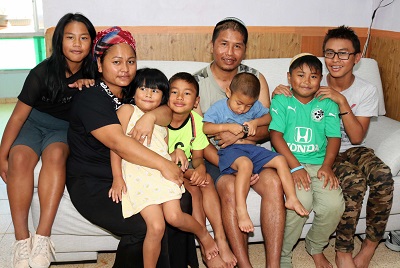
Life in the Horaling family changed forever on November 17, 2017. Dad Ebenezer Horaling, 35, was taking a bus to work as a custodian at a boys’ junior high school 20 minutes away from his home. Ebenezer had gotten off the bus and was walking to the school when a 17-year-old terrorist drove into him, throwing him into the air. He came down hard, fracturing his neck and slamming his head into the ground. The terrorist got out of the car smiling and gripping a knife. Soldiers fired and stopped him from a second attack on Horaling.
Ambulances brought both Horaling and the terrorist to Hadassah Hospital Ein Kerem. On duty in the Shock Trauma Center was Dr. Miklosh Bala, a protégé of famed surgeon Prof. Avi Rivkind. That was good news for Horaling. Dr. Bala, with two other Hadassah doctors, are the authors of a study published in 2016 in the Scandinavian Journal of Trauma, Resuscitation and Emergency Medicine about the severity of injury in terror car-ramming attacks—far higher than in car accidents. The paper took on additional significance following ramming attacks in New York City, Toronto, Barcelona, Paris, London, Stockholm, Nice, and Berlin.
“When I arrived at the hospital, I learned that they weren’t sure my husband was going to make it,” said Ebenezer’s wife, Miriam. Theirs was a long Zionist journey to Israel. The Horaling family lived in northeast India. In the 1980s, several thousand men and women there began a return to Judaism. They were certain that they were descendants of the lost biblical tribe of Menashe, the younger son of Joseph, a tribe dispersed by the Assyrian Empire 2,700 years ago. In 2005, then Sephardic Chief Rabbi of Israel Shlomo Amar accepted their claim to Jewish ancestry but ruled that Bnei Menashe needed to undergo conversion. In 2006, Miriam and Ebenezer, holding the hand of their toddler son, named Magen Yisrael (“defender of Israel”), made aliya. Now that boy was nearing his bar mitzvah and had five younger siblings.
While the neurosurgeons struggled to save Ebenezer, the extended Horaling family—grandparents, siblings, and cousins—prayed in the underground waiting room in the Sarah Wetsman Davidson Hospital Tower. Later, they camped out in a square formed by the wooden benches of the second-floor Healing Garden while Ebenezer remained in the floor’s intensive care unit. Across the hall from Ebenezer lay the terrorist. He recovered and was released to Israel’s security forces. “Having the terror victim and the terrorist in the same unit is a situation we’ve encountered before,” said Prof. Vernon Van Heerdon, who heads the ICU. “It’s a strain on the staff, but that’s our responsibility.”
Two weeks after the attack, Ebenezer opened his eyes and responded to his family, squeezing their hands. There was another long journey ahead for the family. He would need more surgery. He would need physical, occupational and speech therapy at Hadassah’s Mount Scopus campus. Three and a half months after the attack, Magen Yisrael chanted his bar mitzvah portion. Representatives of HWZOA were there to bless the new bar mitzvah.
Ebenezer is home with his family, continuing his rehab as a day patient at Mount Scopus. “Thank you, Hadassah,” says Ebenezer. Miriam adds, “Please send our thanks to all the donors in America and throughout the world who built Hadassah Hospital. From our family who owes them so much, please accept our prayers for a sweet New Year.”
